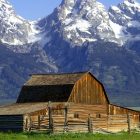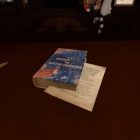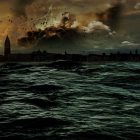Writ in Water: Retraining the Distance Vision
There’s a passage in Donna Tartt’s celebrated The Goldfinch, almost a third of the way in, where our protagonist Theo Decker, given a pill for airplane anxiety by his father, first touches down in Las Vegas. He is arriving for the first time in the West, and Tartt (born in Mississippi, studied in Vermont, lives in Manhattan and Virginia) and her literary eye are too.
The car—which started with the push of a button—was so quiet that at first I didn’t realize we were moving. Away we glided, into depthlessness and space. Accustomed as I was to jolting around in the backs of taxis, the smoothness and chill of the ride was sealed off, eerie: brown sand, vicious glare, trance and silence, blown trash whipping at the chain-link fence. I still felt numbed and weightless from the pill, and the crazy façades and superstructures of the Strip, the violent shimmer where the dunes met sky, made me feel as if we had touched down on another planet.
They are all here, the touchstones of literature in the West: the contrast between the constructed and the natural, the violent quality of the landscape, the surreality of the human attempt to live out there, the stylistic obsession with the horizon and that vast interplay between the sky and the earth, and, most notably, in the customary becoming the eerie, a sense that this place is indeed another world entirely.
This isn’t to say that some of these choices aren’t valuable, necessary, even essential to the land, which also isn’t to say the author has no freedom, that to write the West is to be tied to its prevailing tropes. To visit the desert West, most of all Las Vegas, without detailing the collision between what is built and what remains, stark in the comparatively empty landscape, seems irresponsible or impossible. In the broader West, the similar disparity between indoor and out, if only in the extremeness and manufacture of the difference—air conditioning in the heat, kindling a fire in winter, building bubbles of comfort in the inhospitable—seems required too, but with the West comes a particular violence and cruelty. Anthony Doerr (born in Cleveland, studied in Maine, lives in Boise) and The Shell Collector as a collection take care to paint the gray and cold of the Midwest, particularly through the point of view of his Tanzanian character Naima in “Mkondo” (“Ohio: bleak weather impended over the city like a shroud”), but in “The Hunter’s Wife,” the prose for the winter of Montana is far crueler: “…a three-inch crust of ice covered the snow. On the ranches to the south cattle crashed through and bled to death kicking their way out. Deer punched through with their tiny hooves and suffocated in the deep snow beneath. Trails of blood veined the hills.” Can we say this violence is a certain creation of fiction traveled into the West? For Tartt, not just a shimmer above the dunes but a violent one, a vicious glare, and for Doerr, a Midwestern winter dull and dreary, and a Western winter that can kill?
Though Tartt has a plot device to help—the dubious adult pill (a half-pill) given to Theo that keeps him “high and happy and somersaulting in and out of air-conditioned dreams”—this only aids the already abundant sense of dislocation. The buildings are façades, the quiet too quiet, the movement gliding, the space without depth. Ultimately, to visit the West is to leave the rest of the country behind; to describe the tenuous imposition of life on this world is often to leave the planet entirely.
(For the record, the record for initial Western literary touchstones might belong to Edward Abbey—born in Pennsylvania, studied in New Mexico—in his “nonfiction” classic Desert Solitaire; after an opening paragraph acknowledging the great number of beautiful places in the world, it takes him one additional paragraph to note Utah’s “lonely sky,” and only one more to watch the sun rise over the horizon at Arches National Monument. Then he’s off to the task of heating his housetrailer against the outside snow and cold, the butane warmth artificial in a “dense unhealthy way.” In the first chapter, the Arches expanse is filled with “dark fantastic shapes” in the “monstrous and inhuman spectacle of rock and cloud and sky and space….” That at the end of the chapter he prefers to talk with the morning ravens rather than “learn to carry on intergalactic communications with some obscure race of humanoids on a satellite planet from the world of Betelgeuse” is perhaps not so drastic a choice.)
It’s of course fair to say that many literary landscapes startle and unmoor their characters. Setting often becomes character itself, and the effort to build a “novelscape” with unique yet accessible language is a perpetual challenge. Many authors—myself included, especially now as I sit and write in my native Colorado with door enticingly open to the mountains and the sun setting between the pines—resort, successfully and not, to reworking common trappings of place: the intimate heat of the South, the planted plains of the Midwest, the beaches and palm trees of California. That an eye untrained to the openness of the West would focus first on these headlining details is not surprising. What is remarkable about the West, Tartt’s West as an ideal example, is that the otherworldliness of the place holds transformative power beyond its borders.
When Theo eventually returns to New York, his time in Nevada has changed his experience of the city and his vocabulary, Tartt’s vocabulary, of seeing it.
The skies in New York seemed a lot lower and heavier than out west—dirty clouds, eraser-smudged, like pencil on rough paper. It was as if the desert, in its openness, had retrained my distance vision. Everything seemed dank and closed-in.
The West, as a retraining of the eye for author and character, brings this dank and closed-in vision to the rest of the novel. The West changes not only Theo’s feelings about his return home but also Tartt’s medium of its arrival, the means of its description. New York, now drawn on rough paper, will never again be reproduced with the sharpness and depth of the past. Even the impermanence and shallowness of Vegas, a city swallowable by desert and drought at any moment, has revised the realness of New York: “For so long I’d thought of Vegas as something temporary—my real life was New York—but was it? Not any more, I thought, dismally, surveying the thinned-out trickle of pedestrians hurrying past Bergdorf’s.”
Whether in tropes or trappings or touchstones, we’re going to get another eye on this West, another attempt to frame its impermanence. When the announced film adaptation of The Goldfinch eventually arrives, it will likely be directed by John Crowley (born in Ireland, worked in London, just directed Brooklyn), and the West will be retrained again: in distance, horizon, contrast, and violence. How will this strange world be at once old and new?



